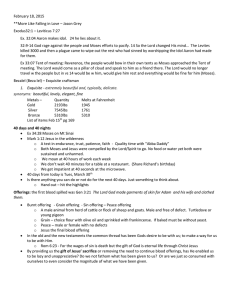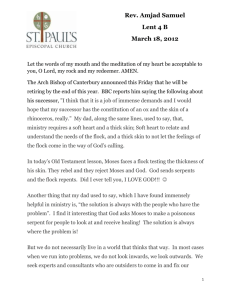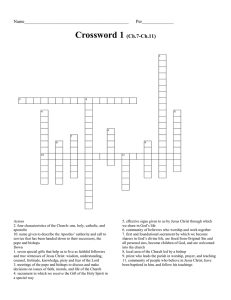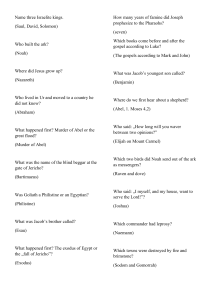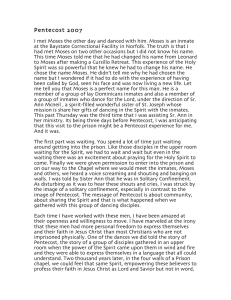Homily for March 6, 2010,
advertisement
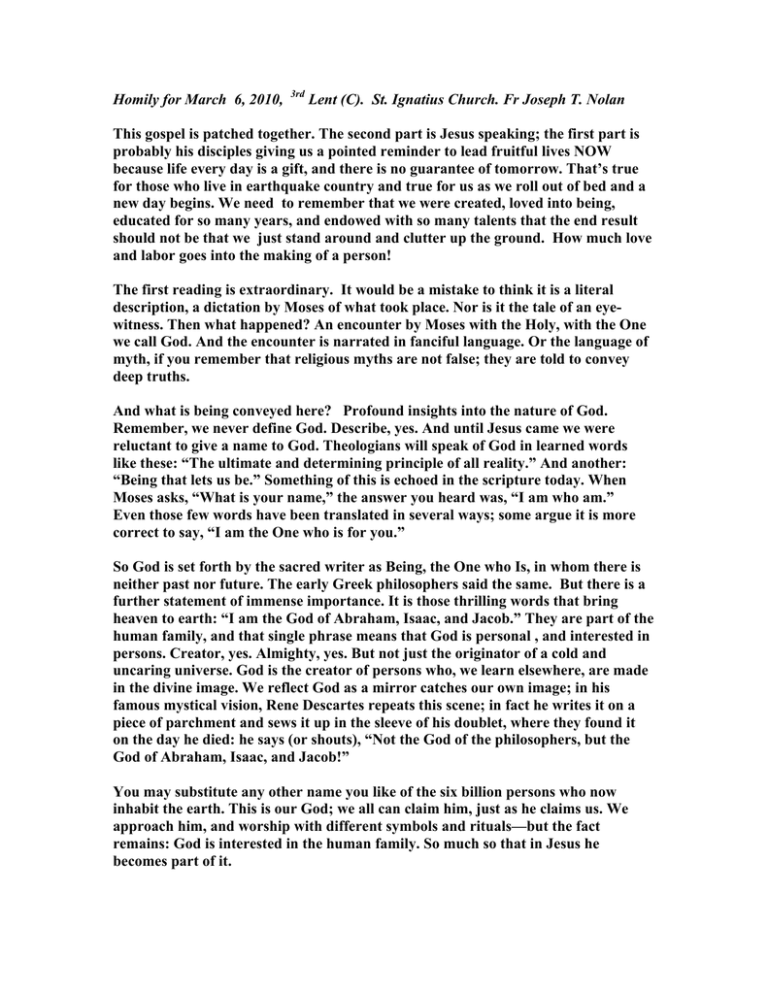
Homily for March 6, 2010, 3rd Lent (C). St. Ignatius Church. Fr Joseph T. Nolan This gospel is patched together. The second part is Jesus speaking; the first part is probably his disciples giving us a pointed reminder to lead fruitful lives NOW because life every day is a gift, and there is no guarantee of tomorrow. That’s true for those who live in earthquake country and true for us as we roll out of bed and a new day begins. We need to remember that we were created, loved into being, educated for so many years, and endowed with so many talents that the end result should not be that we just stand around and clutter up the ground. How much love and labor goes into the making of a person! The first reading is extraordinary. It would be a mistake to think it is a literal description, a dictation by Moses of what took place. Nor is it the tale of an eyewitness. Then what happened? An encounter by Moses with the Holy, with the One we call God. And the encounter is narrated in fanciful language. Or the language of myth, if you remember that religious myths are not false; they are told to convey deep truths. And what is being conveyed here? Profound insights into the nature of God. Remember, we never define God. Describe, yes. And until Jesus came we were reluctant to give a name to God. Theologians will speak of God in learned words like these: “The ultimate and determining principle of all reality.” And another: “Being that lets us be.” Something of this is echoed in the scripture today. When Moses asks, “What is your name,” the answer you heard was, “I am who am.” Even those few words have been translated in several ways; some argue it is more correct to say, “I am the One who is for you.” So God is set forth by the sacred writer as Being, the One who Is, in whom there is neither past nor future. The early Greek philosophers said the same. But there is a further statement of immense importance. It is those thrilling words that bring heaven to earth: “I am the God of Abraham, Isaac, and Jacob.” They are part of the human family, and that single phrase means that God is personal , and interested in persons. Creator, yes. Almighty, yes. But not just the originator of a cold and uncaring universe. God is the creator of persons who, we learn elsewhere, are made in the divine image. We reflect God as a mirror catches our own image; in his famous mystical vision, Rene Descartes repeats this scene; in fact he writes it on a piece of parchment and sews it up in the sleeve of his doublet, where they found it on the day he died: he says (or shouts), “Not the God of the philosophers, but the God of Abraham, Isaac, and Jacob!” You may substitute any other name you like of the six billion persons who now inhabit the earth. This is our God; we all can claim him, just as he claims us. We approach him, and worship with different symbols and rituals—but the fact remains: God is interested in the human family. So much so that in Jesus he becomes part of it. It is not only a God of people who is revealed to us, but one involved in our life and future well-being. The text says, “I have witnessed the affliction of my people; I know what they are suffering.” That is still true but it gives rise to the painful question: why, so often, does God not come to the rescue? Obviously he didn’t, at least in the short run, even with his special people, the Hebrews. One remembers the wry question posed by Tevye in Fiddler on the Roof: “I know it is a great honor to be the chosen people, but could you choose somebody else for a while?” The ultimate rescue from an imperfect world and for mortal creatures is resurrection. But that only becomes thinkable or believable when it happened to Jesus in an unexpected and shattering act by his Father God. We still struggle to believe this. The great doctrines of Christian faith intimately concern us, our wellbeing and our future, but they tower above us, they are mysteries. It is more the case that we participate in them, not that we fully understand them. How do we approach this awesome power that created us from nothing? With profound respect. Moses is told not only to “come no nearer”, but to take off the sandals from his feet. We bow down before God, but not enough. Muslims understand the aspect of God called transcendence, and bow profoundly, forehead to the ground. The liturgical reform in our church has been criticized by some because we greet each other, exchange the peace, receive communion standing and in the hand, and so on. But these practices came about because Vatican II emphasized what I call the third meaning of the words: the body of Christ. The first body is the one he received from Mary. The second meaning is the bread consecrated by the Holy Spirit, that we reverence as the Blessed Sacrament. The third meaning is - us. All the baptized. Pope Pius XII called this the Mystical Body of Christ, and then the church dropped the adjective to emphasize how real it is. The Roman official is wrong who argues that the prime emphasis of the Mass should be adoration. That’s proper for the Blessed Sacrament. The Mass is a time for the whole body of Christ to offer his sacrifice, then to receive him, and then to continue his life in the world. What are the obstacles that keep us from grasping the reality of God in our lives? Sin, yes. But things also. The multiplicity of things. The thing in your hand with so many Apps you can’t resist. I should not complain – this week I received an email that said,“Your poem, Forever Young,” is posted on Facebook to the family who lost their young daughter in a terrible crime. So there are good things in cyber print – the problem is there are too many. The Eternal our God who inserted us into time would like us to take the time to appreciate the excellence of creation and the realness of the divine presence. A poet put it this way: Someone is telling us, be still— to make a space in all our days, slow down the race that’s never won, find time for listening, and praise. Be like a child who does not fear. Be still, and know the Lord is here.


